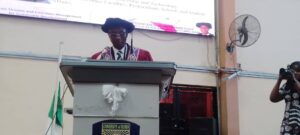

UNILORIN Don To KWSG: Revisit Ilorin Waste Management Facility
Stephen Olufemi Oni, Ilorin
Professor Rafiu Olasunkanmi Yusuf of the Department of Chemical Engineering, University of Ilorin, has called on the Kwara State government to urgently revisit the proposed Integrated Solid Waste Management Facility designed for Ilorin by CIWAT Engineers, with Gbagede identified as its proposed site.
 Delivering the 286th inaugural lecture of the University, titled “Waste Stream and Emissions Management for Sustainable Development”, Prof. Yusuf stressed that the rising volume of waste generated in Ilorin and other urban centres now poses a significant threat to environmental and public health, and must be addressed through practical and science-backed solutions.
Delivering the 286th inaugural lecture of the University, titled “Waste Stream and Emissions Management for Sustainable Development”, Prof. Yusuf stressed that the rising volume of waste generated in Ilorin and other urban centres now poses a significant threat to environmental and public health, and must be addressed through practical and science-backed solutions.
He added: “The population of Ilorin has increased since the CIWAT design was developed, and so has the volume of waste. Revisiting that proposal will help reduce the reckless dumping of refuse across the city.”
He identified inadequate funding and poor enforcement of environmental regulations as critical challenges hindering the effective deployment of sustainable waste management systems in Nigeria.
“Government and the private sector must be willing to fund large-scale research, pilot studies, and the implementation of waste-to-energy technologies. The regulatory mechanism is also weak. Enforcement of existing environmental policies remains inconsistent, often trailing behind technological progress,” the Inaugural Lecturer lamented.
The Inaugural Lecturer underscored the need for a shift towards a circular economy — a system that emphasises waste minimisation, resource recovery, and reuse — as a strategic approach to managing Nigeria’s waste problem.
“The circular economy aligns with my research on material and energy recovery from waste. Technologies like anaerobic digestion, pyrolysis, and gasification are promising avenues for generating renewable energy while managing waste responsibly,” he said.
Prof. Yusuf also noted that the integration of big data and machine learning into waste management systems can dramatically improve efficiency and planning. “Predictive models can forecast waste generation, optimize recycling, and even assess the environmental impact of industrial activities,” he explained.
Highlighting the urgency of reducing greenhouse gas emissions, especially in developing countries, Prof. Yusuf noted that his work on methane and non-methane emissions positions him to contribute meaningfully to climate change mitigation efforts.
He expressed his readiness to collaborate with government agencies, industry players, and fellow researchers in developing sustainable strategies that address emissions and waste challenges simultaneously.
“As we face the global climate crisis, the time to act is now. Waste should not be seen as a burden but as a resource. With innovation, investment, and commitment, Nigeria can lead in waste-to-energy and sustainable environmental engineering,” he admonished.
